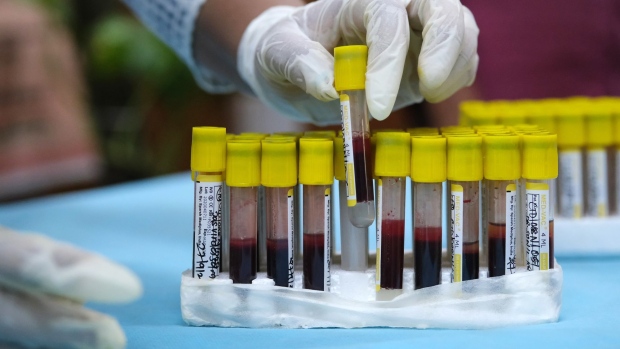Dec 27, 2022
Blood Tests for Alzheimer’s Are the Next Big Focus for Japan’s Fujirebio
, Bloomberg News

(Bloomberg) -- A tiny Tokyo-based diagnostics firm that developed the first US-approved spinal fluid test for Alzheimer’s is now doubling down on developing blood tests — an easier method to detect the brain-wasting disease against which a blockbuster therapy is expected soon.
Fujirebio Holding Inc., a unit of H.U. Group Holdings Inc. with a market value of $1.2 billion, is boosting its line-up of reagents used to detect Alzheimer’s biomarkers in a blood test. It aims to file these tests for approval in the US as early as 2023, according to Fujirebio’s chief executive officer Goki Ishikawa.
“The lineups offered by industry leaders are still limited,” Ishikawa said in an interview. “We are rushing to create a solid lineup of tests as quickly as possible. We can’t wait long, really have to start seeking approvals in the US in a year or so.”
The pressure stems from the expected arrival of lecanemab, a breakthrough medicine from Eisai Co. and Biogen Inc. that may get US approval early next year. Fujirebio is joining a growing group of companies, from Roche Holding Inc. to Quanterix Corp. and C2N Diagnostics, that are expediting research on blood test kits to promptly screen dementia patients and provide an alternative to PET scans, MRI or painful spinal taps. Convenient testing will also help physicians decide who’s qualified to receive lecanemab, the first-ever therapy to clearly slow the progress of Alzheimer’s.
Japan on Dec. 22 approved Sysmex Corp.’s blood test assay kit, co-developed with Eisai, that measures levels of amyloid beta in the blood. The abnormal protein, which jams nerve cells in the brain, is a hallmark of Alzheimer’s.
Brain-Plaque-Removing Drugs
Drugmakers are now also trying to figure out ways to stop this ailment even before it sets in. Eli Lilly & Co. and Eisai are conducting massive final-stage trials to test brain-plaque-removing drugs on thousands of healthy adults, hoping this staves off cognitive decline before it begins, or at least delay its onset.
The flurry of excitement in the field comes on the back of promise shown by Eisai’s novel therapy, which is coming more than a century after the debilitating disease was discovered. Global drugmakers spent billions of dollars researching more than 100 failed experimental drugs before lecanemab came through.
The diagnostics and therapeutics market for Alzheimer’s disease, the most common form of dementia, is expected to touch $9.6 billion by 2027 from $7 billion in 2021, ResearchAndMarkets said in August. Alzheimer’s Disease International estimates dementia could affect more than 80 million people globally in 2030 and over 150 million in 2050.
Detect Biomarkers
Fujirebio, which also sells tests to identify amyloid or tau — another errant protein, is developing other diagnostics to detect biomarkers that can signal neurological injury or map a gene associated with late-onset of Alzheimer’s. The company bought Belgian biotech ADx NeuroSciences NV and Fluxus Inc. in California this year to boost product lineups for blood tests and obtain technology to develop new type of tests with ultra-high sensitivity.
As the blood test makers gear up to provide their products, Fujirebio’s success will be determined by how fast it can supply raw materials and reagents.
“It’s really important for us that blood tests become a standard for diagnosing Alzheimer’s disease and are commonly used,” said Ishikawa. “Once we establish what we can do, we’ll supply ingredients to other companies to swiftly create and expand the market.”
--With assistance from Robert Langreth.
©2022 Bloomberg L.P.


